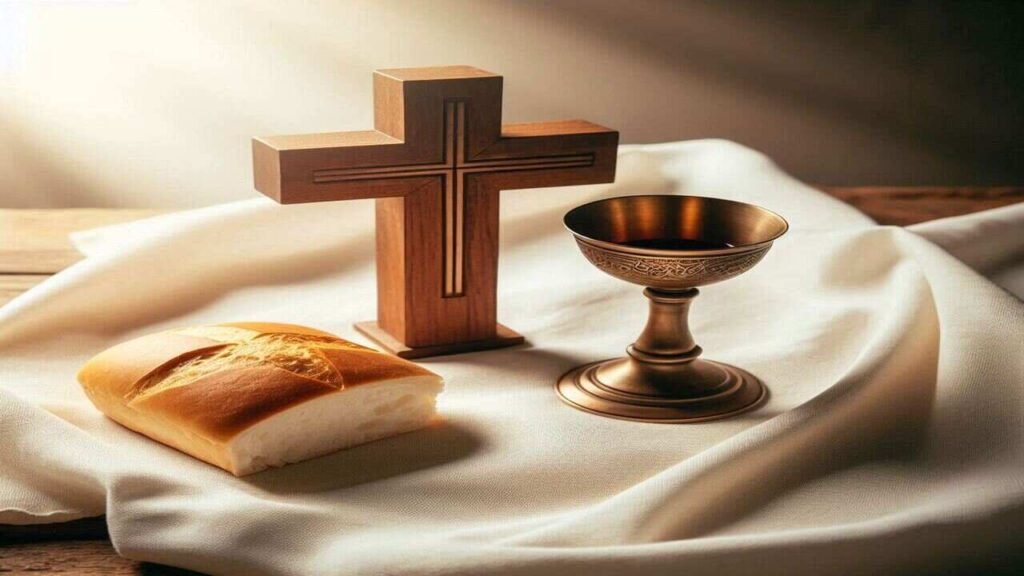In the Christian Church, sacraments are sacred rituals that hold profound significance for believers. These ceremonial acts are considered efficacious signs of divine grace, instituted by Christ and entrusted to the Church. Sacraments serve as outward signs of grace, means of salvation, and symbols of Christ’s presence, playing a crucial role in the Christian faith. From the sacraments of initiation, such as baptism and communion, to the sacraments of healing and vocational consecration, these sacred rites are woven into the very fabric of Christian spiritual life.
Key Takeaways
- Sacraments are sacred rituals that impart divine grace in the Christian faith.
- They serve as outward signs of grace, means of salvation, and symbols of Christ’s presence.
- Sacraments are categorized into initiation, healing, and vocational consecration.
- Baptism, communion, and confirmation are among the sacraments of initiation.
- Reconciliation and anointing of the sick are sacraments of healing.
The Significance of Sacraments in Christianity
Within the Christian faith, sacraments play a profound and multifaceted role, serving as vital Christian rituals that connect believers to the divine. These outward signs of grace instituted by Christ and entrusted to the Catholic Church are seen as visible manifestations of the spiritual truths that underpin the Christian belief system.
Sacraments as Outward Signs of Grace
Sacraments are believed to be tangible expressions of God’s grace, physical representations of the invisible spiritual realities that permeate the Christian experience. Through these rituals, believers are able to encounter the transformative power of the divine, receiving the blessings and graces necessary for their spiritual growth and journey.
The Seven Sacraments of the Catholic Church
The Catholic Church recognizes seven distinct sacraments that serve as the foundational pillars of the faith. These include:
- Baptism: The initiation into the Christian community, symbolizing the cleansing of sin and the rebirth of the soul.
- Eucharist (Communion): The celebration of the Last Supper, where believers partake of the body and blood of Christ.
- Confirmation: The strengthening of one’s faith and the reception of the gifts of the Holy Spirit.
- Reconciliation (Confession): The sacrament of forgiveness, where believers receive absolution for their sins.
- Anointing of the Sick: The anointing and spiritual support for those who are ill or facing the end of life.
- Matrimony (Marriage): The sacramental union of a man and a woman, blessed by the Church.
- Holy Orders: The ordination of men to serve as deacons, priests, and bishops within the Church.
These sacraments of initiation, healing, and vocational consecration serve as tangible expressions of the Christian faith, connecting believers to the divine and symbolizing the spiritual truths that underpin their beliefs.
What role do sacraments play in the Christian faith?
Sacraments occupy a central role in the Christian faith, serving as both means of salvation and symbols of Christ’s presence. These sacred rituals are believed to confer divine grace, connecting believers to God’s salvific work and strengthening their spiritual journey.
Sacraments as Means of Salvation
Through the sacraments, Christians receive the gift of salvation and are united with Christ. Sacraments are essential for the faithful, as they are the primary channels through which believers access God’s grace and experience the transformative power of the divine. By participating in these sacred rites, Christians are renewed, forgiven, and empowered to live according to the teachings of their faith.
Sacraments as Symbols of Christ’s Presence
Sacraments are also revered as tangible signs of Christ’s abiding presence among his followers. In the sacramental elements, such as bread and wine, the faithful believe that they encounter the true presence of Jesus Christ. This profound connection with the divine serves to deepen the believers’ relationship with God and reinforce their spiritual identity as members of the Christian community.
Ultimately, sacraments play a vital role in the Christian faith, providing the faithful with the means to experience salvation and a profound sense of the divine. These sacred rituals are essential for the spiritual growth and nourishment of believers, as they navigate their journey of faith.

“The sacraments are outward signs of inward grace, instituted by Christ for our sanctification.” – Catechism of the Catholic Church
Sacraments of Initiation: Baptism, Confirmation, and Eucharist
The sacraments of initiation – Baptism, Confirmation, and Eucharist – are the foundational rituals that mark a Christian’s journey of faith. These sacred ceremonies lay the groundwork for a lifelong relationship with God and the Church.
Baptism is the first sacrament of initiation, where believers are incorporated into Christ and become part of God’s people. This holy rite pardons sins and brings individuals to the dignity of adopted children, welcoming them into the family of the Church.
Confirmation is the second sacrament of initiation, filling believers with the power of the Holy Spirit. This sacrament makes believers more completely the image of the Lord, empowering them to bear witness to Christ before the world.
The Eucharist, as the “source and summit of the Christian life,” enables believers to share in the universal sacrifice and receive the body and blood of Christ, the food of eternal life. This sacrament is the pinnacle of the Christian’s initiation, nourishing and sustaining them in their faith.
Together, these sacraments of initiation – Baptism, Confirmation, and Eucharist – lay the foundations for a life of discipleship and communion with God and the Church.
“Baptism, Confirmation, and the Eucharist – the sacraments of Christian initiation – lay the foundations for every Christian life.”
Sacraments of Healing and Vocational Consecration
The Christian faith recognizes two distinct categories of sacraments: the sacraments of healing and the sacraments of vocational consecration. These sacred rituals hold profound meaning and significance for believers, offering comfort, renewal, and a deeper connection with the divine.
Reconciliation and Anointing of the Sick
The sacraments of healing, which include Reconciliation and Anointing of the Sick, provide a source of solace and grace for those who are struggling with illness, spiritual distress, or the weight of their sins. Reconciliation offers believers the opportunity to renew their faith, receive forgiveness, and restore their relationship with God and the Church. This sacrament is a powerful reminder of the transformative power of divine mercy and the healing that can come from acknowledging and repenting one’s transgressions.
Anointing of the Sick, on the other hand, unites the person’s suffering with the crucifixion and death of Christ, providing a deeper understanding of the redemptive nature of pain and the promise of eternal life. This sacrament is a testament to the Church’s compassion and desire to support its members during their most vulnerable moments, strengthening their faith and offering them the comfort of God’s presence.
Matrimony and Holy Orders
The sacraments of vocational consecration, which include Matrimony and Holy Orders, are sacraments that consecrate individuals for specific vocations and missions within the Church. Matrimony is the sacrament that blesses the union between a man and a woman, establishing a lifelong covenant and providing the grace necessary to navigate the challenges and joys of married life. Holy Orders, on the other hand, is the sacrament that ordains men to the priesthood, equipping them with the spiritual authority and responsibility to serve the faithful, celebrate the sacraments, and lead the Church in its mission.
These sacraments of healing and vocational consecration are essential components of the Christian faith, offering believers the opportunity to experience the transformative power of God’s grace and the guidance needed to fulfill their unique callings within the Church.
Conclusion
Sacraments are essential rituals in the Christian faith that play a profound role in the lives of believers. They serve as outward signs of God’s grace, means of salvation, and symbols of Christ’s presence, connecting Christians to the spiritual truths of their faith. From the sacraments of initiation that lay the foundation of the Christian life, to the sacraments of healing and vocational consecration, each ritual holds deep significance in the spiritual journey of believers.
Sacraments are central to the practice of Christianity, strengthening the relationship between God and His people. These sacred rites are not merely symbolic gestures, but profound experiences that transform the lives of believers and deepen their connection to the divine. As Christians continue to participate in these essential rituals, they find themselves rooted in the timeless traditions of their faith and empowered to live out their calling as followers of Christ.
Ultimately, the sacraments serve as a bridge between the earthly and the heavenly, allowing believers to experience the tangible presence of God in their daily lives. Through these sacred ceremonies, Christians are reminded of the power of God’s grace and the transformative potential of their faith, inspiring them to live with purpose, hope, and a deep sense of spiritual fulfillment.
FAQ
What role do sacraments play in the Christian faith?
Sacraments play a crucial role in the Christian faith, serving as outward signs of grace, means of salvation, and symbols of Christ’s presence. They are considered efficacious signs of grace, instituted by Christ and entrusted to the Church, by which divine life is dispensed to believers.
What are the seven sacraments of the Catholic Church?
The Catholic Church acknowledges seven sacraments: Baptism, Eucharist, Confirmation, Reconciliation, Anointing of the Sick, Matrimony, and Holy Orders. These sacraments serve as outward signs of grace, connecting the receiver to God and symbolizing the spiritual truths of the Christian faith.
How do the sacraments of initiation lay the foundation of the Christian life?
The sacraments of initiation – Baptism, Confirmation, and Eucharist – lay the foundations of every Christian life. Baptism incorporates believers into Christ and forms them into God’s people, pardoning sins and bringing them to the dignity of adopted children. Confirmation fills believers with the Holy Spirit, making them more completely the image of the Lord, so that they may bear witness to Him before the world. The Eucharist, as the source and summit of the Christian life, enables believers to share in the universal sacrifice and receive the body and blood of Christ, the food of eternal life.
What is the significance of the sacraments of healing and vocational consecration?
The sacraments of healing, including Reconciliation and Anointing of the Sick, offer the comfort of God’s grace to those who are ill or seeking spiritual renewal. Reconciliation provides an opportunity for believers to renew their faith and receive forgiveness for their sins, while Anointing of the Sick unites the person’s suffering with that of Christ’s crucifixion and death. The sacraments of vocational consecration, Matrimony and Holy Orders, are sacraments that consecrate individuals for specific vocations and missions within the Church, such as marriage and ordained ministry.








